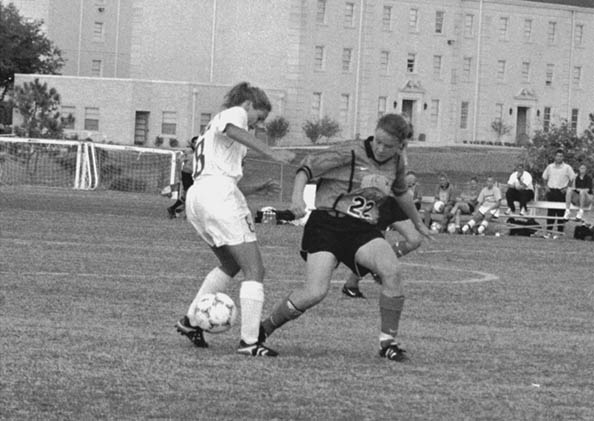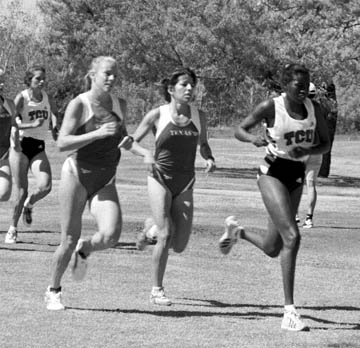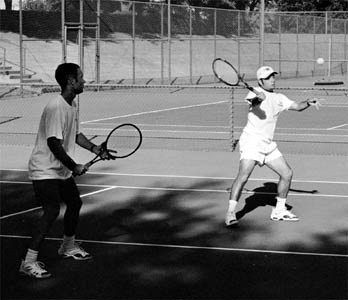By Victor Drabicky staff reporter The TCU women's soccer team extended their losing streak to four games on Wednesday by losing 2-1 to Oklahoma State at the TCU Soccer Complex. Oklahoma State scored the first of their two first-half goals only five minutes into the game when forward Missy Moss put the ball through goalkeeper Danielle Reitnouer's hands. Junior defender Christy Filice said the goal is characteristic of the Frogs as of late. "We have been dominating the games, but letting in easy goals," Filice said. "It makes it tough to win games when you give goals away, but can't score any." The Frogs did manage to score one goal in the second half, but continued to struggle offensively taking only five shots in the game. Senior forward Allison Calleri said the Frogs had trouble keeping their shots on target.
Head coach David Rubinson said the Frogs played well, but continued to have problems offensively. "It's the same song, different verse," Rubinson said. "We played well enough to win the game, but couldn't capitalize on our opportunities." Filice said some of the Frogs' offensive struggles stemmed from poor play as a team. "We didn't work together," said Filice. "We can't expect to win games if we can't play well together." Rubinson said despite losing the game and struggling offensively, the team played well. "We owned the ball for most of the game," Rubinson said. "We played well, and we created chances. We just had a few mental lapses that cost us some goals." Calleri said it is important for the team to forget about the game and focus on Friday's match against the University of Texas. "We want to end the season on a winning note," Calleri said. "The University of Texas has a good team. If we could go out and beat them, it would be a good win for us and a good way to end the season." The Frogs finish up their season at 4 p.m. on Friday at the TCU Soccer Complex when they play host to the University of Texas.
Abby Thompson contributed to this article. Victor Drabicky
By Steven Baker staff reporter Although sophomores Glady's Keitany and Katie Singleton have led the cross country team this year with a combined nine top 10 finishes, they both said the team drives them to compete at their best. Singleton said the team aspect is what keeps her going. "I try and make sure that I am focused on the race and the task at hand," she said. "When the team does better, you can pull off of what they are accomplishing. When you pass a runner, that can be a two point swing in a race. There is so much more at stake when you are running for the team." When sophomore Robin Schacht went out earlier in the season with a hip injury, the Western Athletic Conference preseason pole that predicted the TCU women to finish first, seemed a little premature. But Keitany and Singleton have improved on their freshman seasons to help the team through this teammate's injury. Keitany has led the team this year with five individual top 10 finishes, while Singleton finished the regular season with four top 10 times in five races.
"I know what my own challenges are, but the whole team has to be thinking that they can win this race," he said. "Coach Waters has been trying to help us think as a team all season. We warm-up together, run with each other and cool down together." Head cross country coach Dan Waters said having Singleton and Keitany up front really sets the pace for the rest of the team. "Their talent drives them further in the race, but there is really no separation between them and the rest of the team besides their times," he said. "They do the little things that we talk so much about in practice. The right diet, running hard in practice and sleeping right are all a part of this." Waters said when Schacht went out, Keitany and Singleton really stepped up their performances. "They want Robin out there even more than I do," he said. "But when she went out with an injury, they didn't blink an eye. They just kept getting stronger and running faster at the meets." In 1998 WAC Championships, Schacht finished 16th, Keitany 4th and Singleton 17th. Keitany received WAC freshman of the year after the leading the women to a third place finish overall. Singleton said having her college cross country experience last year is what has helped her step up her performance. "This year I have been lucky and not gotten injured," she said. "But a year of experience, knowing the competition and courses, does help." Waters said the Singleton and Keitany just need to keep running like they have been for the women to have a chance at the WAC Championships. "There is no other team out there right now that has the group of sophomores like ours," he said. "If Keitany and Singleton keep improving, then they will be two of the top runners in our region and All-Americans by their junior and senior year."
Steven Baker
By James Zwilling skiff staff Fifteen years after his first game with a YMCA team, junior Doak VanEnk can't even remember not playing soccer. "I don't really know what got me started in the sport," VanEnk said. "Nobody in my family has ever played the sport. My mom said I just asked to be on a team, and that is how it all began." Today, VanEnk is a starting midfielder for the Horned Frogs on the heels of being named to Soccer America's Men's College Team of the Week from Oct. 11-17. VanEnk received the honor after scoring the game-winning goal versus Southern Methodist University Oct. 17 in TCU's first-ever victory over the long-time rival. VanEnk said the game was very important to the entire team. "We really needed the SMU game," he said. "It really boosted our confidence and gave us the confidence to know that we can win the Western Athletic Conference." VanEnk said he is just one member of the team which was responsible for the win and didn't expect the honor. "It was really a surprise to receive the award," VanEnk said. "It was unexpected, but I was happy to find out." VanEnk's road to recognition has not been as smooth as the business major would have liked after transferring from the Naval Academy following his freshmen year. Due to NCAA regulations, VanEnk was forced to sit out all of last year. "It was tough at first to sit out a year," VanEnk said. "It was really tough not being able to play - I even missed going to practice every day." However, VanEnk said he feels he has adjusted well to the program at TCU. "At Navy, the military stuff really conflicted with soccer," he said. "It made it difficult for the coaches and the players." Although VanEnk received a varsity letter as a freshmen at Navy, he said transferring to TCU was not a hard decision. "Growing up in Dallas, I had played with several of these players before, and I really liked the coaches, other players and the university itself," he said. The coaching staff was not entirely new to VanEnk who played with assistant coach Blake Amos in the Olympic Training Program. The program consisted of district, regional, state and national teams. "The Olympic Training Program was a wonderful experience," VanEnk said. "I was playing with great coaches and great players. I was exposed to a different level of play." VanEnk said several of these individuals have made an impact on his soccer career. "I have had several really good coaches who have been my role models on the field," he said. "I also look to all of my teammates at TCU as role models." Off the field, VanEnk looks a little closer to home for inspiration. "My parents have done so much for me off the field," he said. "They have supported everything I have done in life and in soccer." As for the future, VanEnk said he doesn't know where soccer will lead him. "I'd like to play professionally after college, but right now I just can't tell what will happen," he said. For now, VanEnk said he will concentrate on helping his team make it to the NCAA tournament and be thankful for the things that soccer has already given him. "The competitiveness that soccer has taught me I will carry with me in everything I do, and I know some of the friendships I have made will last a lifetime."
James Zwilling
By Matt Stiver staff reporter Some things are a mystery. When forming a doubles team, TCU women's tennis coach Roland Ingram and men's coach Michael Center must get several key components to line up. They also need a little luck. Ingram said he looks for the style of play and rapport the players have when forming a doubles team. The rapport is vital, he said. "It's hard," he said. "You think you can say, 'These girls would be a great doubles team.' But if they don't think alike, it will be very difficult for them to gel. You just keep trying and trying. The girls I usually say can never be a good doubles team are usually the best." Center also said matching personalities and styles of play are important. "I try to find guys that complement each other," Center said. "I try to find guys that when they return, one guy might return one side better than the other.
Ingram said finding a successful doubles pairing can prove difficult. "It just happens, Ingram said. "(In the movie 'Shakespeare in Love,') every time they would get in trouble, Shakespeare (played by Joseph Fiennes) would say, 'This isn't going to happen. It isn't going to work.' Then (Jeffery Rush's character) would say, "It will all work out. Why? I don't know, It's a mystery really.' And that's exactly the way doubles is. It's a mystery." Center said the men's team has a ritual during doubles play. "After every point when you're playing doubles, something needs to be said to your partner," Center said. "Whether it's look for this guy to serve to your forehand or let's serve the ball up the line, something has to be said so (they) are really and truly working as a team. Junior Martin Jirak, who teams with fellow junior Esteban Carril to form the No. 10 doubles team in the nation, said he and Carril discuss strategy. "Basically, when we serve, we decide (what to do)," Jirak said. "So if I serve, he'll tell me where to serve and I'll say, 'Okay' or 'No I don't think that's a good idea.' (Sometimes we say) lets take it down the line, or lets find out which (opponent) is weaker on volleys and which is weaker on the baseline." The women's team does things differently, Ingram said. "We have to give high-fives, whether good shot or bad shot, and smile," Ingram said. "In women's tennis, it's more what you don't say than what you say. If (one player) is frowning or grumpy, (the other) will think, 'Uh oh. She's mad.' In men's tennis they don't care how you look as long as you do what you're supposed to do." Center said playing doubles is completely different than playing singles. "The strategies are different, and the movement is different," Center said. "Obviously, you're trying to get to the net all the time. It really has to be two guys in sync: You have to be conscious of your partner and what he's doing all the time. When reflecting on his career at TCU, Ingram said his best doubles team did not start that way. "(That would be) Tory Plunkett and Rene Simpson," Ingram said "(These were) two girls that at the beginning liked each other like a cat and a dog, had exactly opposite games, would not talk to each other and I made them play together. I made them play together, the chemistry was there and they made All-American. Why? It's a mystery."
Matt Stiver |
| The TCU Daily Skiff © 1998, 1999 Credits |
 "We shot to the left of the goal, above the goal, we
even had a shot hit the crossbar," Calleri said. "We'll never
score if we don't get our shots on goal."
"We shot to the left of the goal, above the goal, we
even had a shot hit the crossbar," Calleri said. "We'll never
score if we don't get our shots on goal." Keitany said she has to be more positive in the last half
of the race to do her part for the team.
Keitany said she has to be more positive in the last half
of the race to do her part for the team. "You've got to look at their personalities, how they
interact with each other, because they're really playing as a team. I like
to find two guys that can pump each other up."
"You've got to look at their personalities, how they
interact with each other, because they're really playing as a team. I like
to find two guys that can pump each other up."